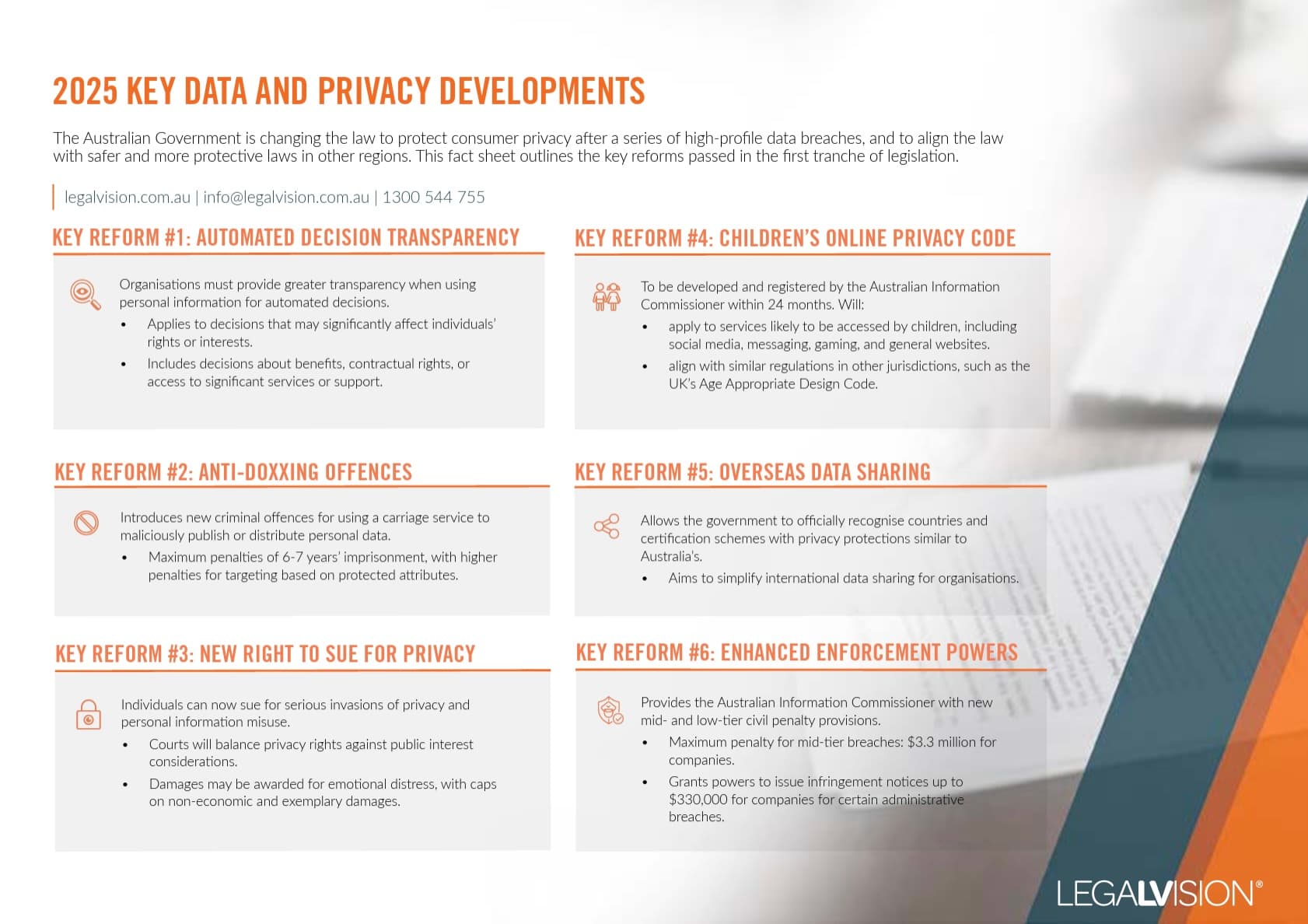In March 2024, there have been significant changes to Australian privacy laws. The law now places a higher standard for collecting and using identity information. In particular, the Australian Privacy Principles (APPs) directly impact those in the real estate industry and their ability to market to consumers. This article explores the impact of the APPs on the real estate industry and details the effects of these legal changes.
What are the Australian Privacy Principles?
Within the Privacy Act, there are 13 Australian Privacy Principles (APPs) that set out how your business may:
- collect;
- use;
- disclose; and
- store personal information.
The APPs also set out access and correction rights for you and a requirement for your business to:
- have a privacy policy; and
- include specific details in that policy.
How Do the APPs Impact the Real Estate Industry?
Australia’s privacy laws affect most aspects of the real estate industry. Some of these areas include:
- the requirement to establish or update privacy policies so that they comply with the APPs;
- the obligation on businesses to limit the storage of personal information to what is reasonably necessary;
- enhanced regulations on how this personal information will be used for direct marketing;
- more time-consuming duties for disclosure of private information to overseas entities; and
- having to ensure the security of all personal information, both in an electronic database and in hard copy.
Previously, if a person applied to lease a property online or at an open-house inspection, an agent could request copies of certain documents, including:
- passports;
- Medicare cards;
- Australian Citizenship certificates;
- birth certificates; or
- driver’s licences.
Under the APPs, the agent can only ask for documents that are reasonably necessary for carrying out the agency’s functions.
Likewise, real estate agents must notify applicants of information regarding:
- their reasons for the collection of personal information;
- the consequences, if any, of not providing personal information;
- where and who the information will go;
- the way(s) a person can gain access to any personal information your business collects; and
- the way(s) a person can formalise a complaint against your agency for misuse of personal information.
Can I Request to Collect Government-Related Documents?
In most government documents, you will find a unique number that identifies you. This could be your:
- medicare number;
- Centrelink reference number;
- driver’s licence number; and
- many more.
It is important to note that as a real estate agent, you cannot share this information. If, for some reason, you need to use or share these documents, they must erase your unique number. A practical example may be the use of a driver’s licence, which may contain health information, such as your donor status. These details are considered ‘sensitive’ under the Privacy Act, which gives a potential buyer or lessee the right to erase this kind of health-related information.
When is Disclosure of My Personal Information Allowed?
As a real estate agent, you must lawfully share your personal information according to the provisions of the Privacy Act. This means you need to have a main reason, also known as the primary purpose, for collecting it. In such instances, you will not require consent from the individual.
What Information Are Real Estate Agents Not Allowed to Request?
As a real estate agent, you must adhere to the Privacy Act, ensuring that you collect only the information necessary for the primary purpose, such as assessing applications from potential tenants like yourself. When you ask prospective buyers and renters for personal information, it should serve a necessary function for the agency’s operations. Remember, your actions must always be lawful, fair, and not overly intrusive.
Real estate agents cannot store sensitive personal information, such as:
- health status;
- ethnicity;
- religion;
- gender; or
- sexual preference.

This factsheet outlines the Australian Government’s strengthened consumer privacy laws in 2025 following major data breaches and their alignment with global standards.
Key Takeaways
If a real estate agent is sending you direct advertising after collecting your details previously, the amended Privacy Act may cover them. Moreover, they are not misusing your personal information by doing this.
If you have any questions about privacy principles for your real estate business, our experienced real estate lawyers can assist as part of our LegalVision membership. For a low monthly fee, you will have unlimited access to lawyers to answer your questions and draft and review your documents. Call us today on 1300 544 755 or visit our membership page.
We appreciate your feedback – your submission has been successfully received.











